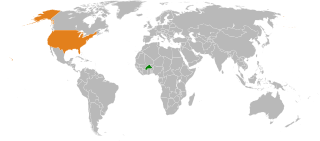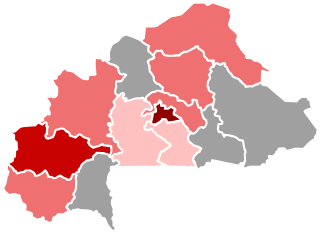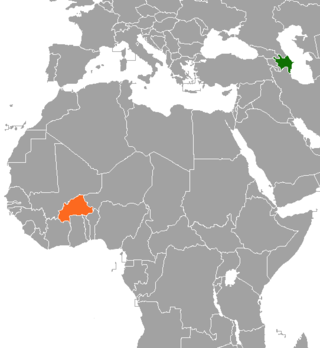Related Research Articles

Burkina Faso is a landlocked country in West Africa with an area of 274,200 km2 (105,900 sq mi), bordered by Mali to the northwest, Niger to the northeast, Benin to the southeast, Togo and Ghana to the south, and the Ivory Coast to the southwest. As of 2021, the country had an estimated population of 20,321,378. Previously called Republic of Upper Volta (1958–1984), it was renamed Burkina Faso by President Thomas Sankara. Its citizens are known as Burkinabè, and its capital and largest city is Ouagadougou. Its name is often translated into English as the "Land of Honest Men".

The Politics of Burkina Faso takes place in a framework of a semi-presidential republic, whereby the Prime Minister of Burkina Faso is the head of government, and of a multi-party system. The President of Burkina Faso is the head of state. Executive power is exercised by both the President and the Government. Legislative power is vested in both the government and parliament. The party system was dominated by the Congress for Democracy and Progress (CDP) until 2014. Burkina Faso's CDP fell victim to a series of demonstrations and riots, to alter the constitution and extend the former president's term in office - referred to as the 2014 Burkinabé uprising. The military then declared itself to be in power and the state shifted to an electoral autocracy. Burkina Faso lacks the foundation that would support a democracy, with its current transition to a military regime, but not all hope is lost. After an internal coup ousted Paul-Henri Sandaogo Damiba, the previous military head of state, a new transitional charter was adopted, naming Captain Ibrahim Traoré as president. Mr. Damiba's progressional failures on the state's security front “swung a majority of domestic opinion in favour of the MPSR”. Mr. Traoré pledged a major reinforcement of armed forces to strengthen frontline units and recruited over 3,000 more troops. As the violence becomes so entrenched, it is nonetheless expected that the security situation will remain dire in the medium term. “However, we expect that elections will still be held in 2024 as part of the army's plan to stabilise the security situation by boosting counter-terrorism operations.”

Burkina Faso has good relations with the European Union, African and certain Asian countries. France, the former colonial power, in particular, continues to provide significant aid and supports Compaoré's developing role as a regional powerbroker.

Michel Kafando is a Burkinabé diplomat who served as the transitional President of Burkina Faso from 2014 to 2015. He served in the government as Minister of Foreign Affairs from 1982 to 1983 and was the Permanent Representative (Ambassador) of Burkina Faso to the United Nations from 1998 to 2011.

Relations between Burkina Faso and the United States are good but has been subject to strains in the past because of the Compaoré government's past involvement in arms trading and other sanctions-breaking activity.

Céline Yoda is a Burkinabé politician. She was the ambassador of Burkinabe in Taiwan (R.O.C) from 2013-2017.

Burkina Faso–Russia relations are the bilateral relations between the two countries, Burkina Faso and Russia. Diplomatic relations between Burkina Faso and the Soviet Union were established for the first time on February 18, 1967. After the breakup of the Soviet Union, Burkina Faso recognized Russia as the USSR's successor. However financial reasons has shut the embassies between the two nations. In 1992, the embassy of the Russian Federation in Ouagadougou was closed, and in 1996, the embassy of Burkina Faso in Moscow was closed. Burkina Faso has since re-opened its embassy in Moscow. Russia is accredited to Burkina Faso from its embassy in Abidjan. In July 2023, the embassy of Russia re-opened.

Burkina Faso–Canada relations refers to bilateral foreign relations between the two countries, Burkina Faso and Canada. Canada and Burkina Faso established diplomatic relations in 1962. Canada and Burkina Faso share French as a common language and work together on regional and multilateral issues.

Burkina Faso–North Korea relations refers to the current and historical relationship between the Democratic People's Republic of Korea (DPRK) and Burkina Faso. Neither country maintains an embassy in the other, although the DPRK formerly had an ambassador accredited in the Burkinabé capital Ouagadougou.

Burkina Faso–Sweden relations refers to the current and historical relationship between Sweden and Burkina Faso. Burkina Faso has a non-resident ambassador located in Copenhagen, Denmark and an honorary consulate in Uppsala. Sweden has an embassy in Ouagadougou, which was opened in 2010.

Burkina Faso–India relations refers to the international relations that exist between Burkina Faso and India. Burkina Faso maintains an embassy in New Delhi. India maintained an embassy in Ouagadougou from November 1996 until its closure in July 2002. Currently, India maintains an honorary consulate in Ouagadougou, which functions under the jurisdiction of the High Commission of India in Accra, Ghana.

Burkina Faso–China relations refers to the foreign relations between Burkina Faso and China. Burkina Faso has an embassy in Beijing and China has an embassy in Ouagadougou.

The COVID-19 pandemic in Burkina Faso was a part of the ongoing worldwide pandemic of coronavirus disease 2019 caused by severe acute respiratory syndrome coronavirus 2. The virus was confirmed to have reached Burkina Faso on 9 March 2020. The death of Rose Marie Compaoré, a member of the National Assembly of Burkina Faso, on 18 March marked the first recorded fatality due to COVID-19 in Sub-Saharan Africa.

Bilateral relations exist between the Republic of Azerbaijan and the Republic of Burkina Faso in the diplomatic, cultural, socio-economic and other spheres. Neither country has a resident ambassador. Burkina Faso has a non resident embassy in Ankara.

Burkina Faso–Turkey relations are the foreign relations between Burkina Faso and Turkey. Turkey and Burkina Faso enjoy strong and friendly bilateral relations. Bilateral relations gained momentum after the opening of the Turkish Embassy in Ouagadougou and the Embassy of Burkina Faso in Ankara in 2012 and in 2014 respectively.